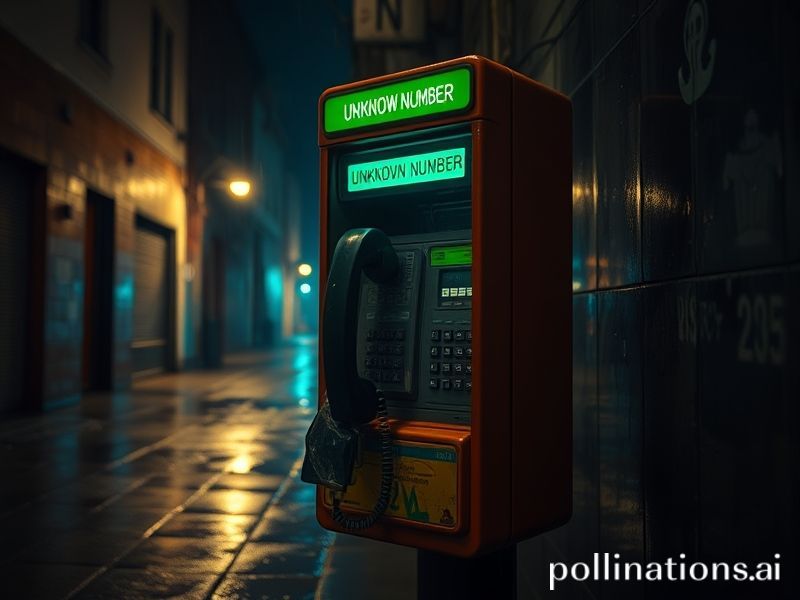Unknown Number: The Global Robocall Pandemic Uniting Humanity in Dread
The Universal Terror of “Unknown Number”
A dispatch from the global frontline of unsolicited anxiety
By the time you finish this sentence, roughly 47,000 smartphones will vibrate with the same three-word epitaph: “Unknown Number.” From Lagos to Lisbon, the reaction is synchronized: a micro-flinch, an audible sigh, a thumb hovering like a reluctant executioner. The unknown caller is the last truly democratic institution left on Earth—equally capable of harassing a Mumbai tuk-tuk driver on a 12-hour shift or an Oslo hedge-fund manager during his microdosing retreat. One ring to rule them all, and in the darkness bind them to voicemail.
Geopolitically, the unknown number is the perfect Trojan horse. It slips past customs, laughs at firewalls, and moonwalks across borders without a visa. Chinese robocall farms impersonate the IRS in flawless Kansas twang; Russian SIM farms spoof Ghanaian area codes to sell fake crypto. Meanwhile, the actual Ghanaian entrepreneur trying to call his supplier in Rotterdam gets sent straight to digital purgatory because, well, “unknown.” Globalization’s greatest trick was convincing the world that every unknown number is a scam, then selling us caller-ID subscriptions to discover that—surprise!—it still is.
The numbers themselves have become a kind of Esperanto of dread. In Bogotá, they call them “llamadas fantasma”; in Berlin, “unbekannt Nummer” sounds like the title of a Kafka reboot nobody asked for. Yet the emotional grammar is identical: cortisol spike, flash of existential dread, brief fantasy that it might be a long-lost lover or a publisher clearinghouse for the Nobel you forgot to enter. Spoiler: it’s an automated Mandarin voice promising to arrest your social-credit score if you don’t press 2.
International law, naturally, is playing catch-up in its usual dignified crawl. The EU’s GDPR can fine a Luxembourg data broker into oblivion for misplacing a cookie, but shrugs when a VoIP server in Moldova rings every pensioner in Portugal pretending to be Interpol. The UN briefly floated a treaty—“The Convention Against Telephonic Dickishness”—but negotiations stalled when delegates realized they’d have to surrender their own robocall databases. The United States responded by proposing a 57th anti-spam act, which will surely work this time, just like the last 56, give or take a lobbyist.
Meanwhile, the market has stepped in with its usual blend of innovation and extortion. Nigerians pay a premium to network providers for “Do Not Disturb” filters that still let through the President’s campaign spam. Indians download Truecaller religiously, trading their contact books for a blue checkmark next to their own name—a Faustian bargain sealed with a push notification. Scandinavians, ever the optimists, answer anyway on the off-chance it’s a survey about happiness, then wonder why their contentment scores dip 3% every quarter.
The cultural fallout is subtle but total. Unknown numbers have become the new black plague, carried not by fleas but by curiosity. Couples now bond over shared screenshots of missed calls at 3:14 a.m. from Tajikistan. Parents teach toddlers to swipe left on anything without a name; stranger-danger updated for the SIM-card era. Even diplomats aren’t immune: at last year’s G20, an aide’s phone buzzed “Unknown” mid-handshake, prompting a micro-pause that historians will someday call the two-second cold war.
And yet, amid the global shiver, there remains a perverse solidarity. We are all citizens of the same paranoid republic, passport-stamped by a missed call from Vanuatu. The unknown number is the one experience that still unites a planet otherwise busy building walls—both physical and digital—to keep each other out. In that sense, every robocall is a grim love letter from the world to itself: “I’m still here, pretending to be your bank, and you’re still there, pretending not to care.”
So the next time your pocket vibrates with spectral digits, remember: somewhere across the globe, another human is staring at the very same screen, thumb twitching in the same existential dance. One small ring for man, one giant pain in the ass for mankind.







